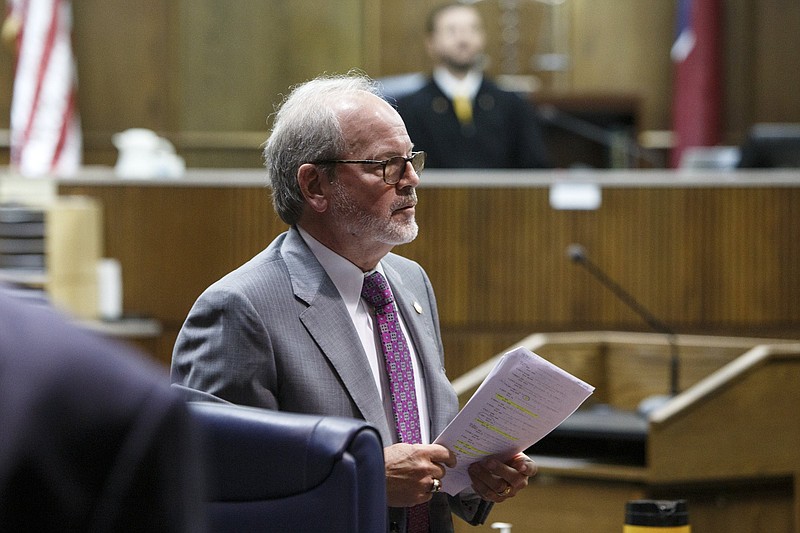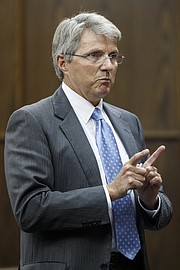An "adopted political strategy" that involved a former city attorney and a Hamilton County Criminal Court clerk led to a county commissioner getting charged with extortion, his defense attorney argued on the first day of his trial.
Incumbent Tim Boyd pleaded not guilty Wednesday to threatening then-campaign opponent Brent Lambert, the outgoing East Ridge mayor, to drop out of their race earlier this year for the Hamilton County Commission District 8 seat.
His attorney, Lee Davis, told jurors Boyd had a right to tell Lambert the damaging information he planned to use against him in their race.
In his opening statement, Davis pointed the finger at Lambert for recording three phone calls without Boyd's knowledge; Lambert's personal lawyer and former East Ridge City Attorney, John Anderson, for setting Boyd up with a damaging question at a local debate; and Criminal Court Clerk Vince Dean, a former East Ridge mayor and state representative, for recording that debate and turning the tape over to a Tennessee Bureau of Investigation agent.
From there, the TBI worked with District Attorney General Neal Pinkston to secure an extortion charge against Boyd the day before early voting began in their May 1 primary. Boyd ultimately defeated Lambert with about 65 percent of the vote and has been out on bond while his charge is pending.
"The reason I tell you [all of this is] because I want you to know Brent Lambert had a calculated political strategy from the very beginning of the case," Davis said.
Dean replied he had "nothing, nothing, nothing, to do with the TBI investigation." Anderson did not return a call for comment on his cellphone. And Lambert is expected to testify Thursday in Hamilton County Criminal Court.
Pinkston, meanwhile, said none of Davis' argument matters.
"Those phone calls aren't about politics," he said. "They aren't about redevelopment. They're a threat to an individual to remove himself. And that's not free speech. That's not political speech. When you act in that way, you've violated the law."
Pinkston began Wednesday's trial by calling Mike Mallen, a former lawyer at Miller & Martin who specializes in real estate and economic development and is part of the group holding the 141-acre former Wheland and U.S. Pipe properties off South Broad Street.
Mallen said Boyd contacted him on Feb. 15 while he was home, sick with the flu, and asked him to tell another attorney that he would release damaging information about Lambert, Lambert's parents and Lambert's employer, the Tennessee Valley Railroad Museum, unless Lambert turned in his papers. That attorney was Allen McCallie, another Miller & Martin lawyer who testified that he represents the museum.
Mallen and McCallie said Boyd didn't specify what kind of information he had. Both men said they knew Boyd from his multiple terms on the commission.
McCallie said he got in touch later that evening with Lambert, who didn't know what was going on either. In his opening statement, Davis said Lambert seemed to understand what Boyd was referring to the next morning, Feb. 16, when he called Boyd and recorded him. (McCallie testified that he never told Lambert to record Boyd but rather to speak with him in person.)
The Times Free Press has previously reported on those phone calls, which Lambert played at a news conference in April at which members of the public were barred from entering.
He and Boyd's conversations dealt with a June 2017 special-called meeting at which the East Ridge City Council approved more than $4 million in infrastructure improvements for an Interstate 75 Exit 1 project. Twelve days later, Lambert received $3,000 in campaign contributions from developers associated with the project. He hadn't had a campaign going since 2014 and used the money to pay off a loan he'd made to himself during the campaign.
Boyd said he planned to use that information against Lambert if Lambert stayed in the race. That information was publicly available in campaign finance reports and had been published on Feb. 3 on an online media outlet, East Ridge News Online, before the recorded phone calls.
After the first phone call, Lambert met with Pinkston, who reached out to the TBI about possible extortion on Feb. 20. Lambert said he then recorded two more phone calls in the following days. In March, near the end of a political debate, an unidentified person wrote a question asking Boyd why he threatened Lambert and his family. Boyd replied that Lambert's contributions smelled bad.
Davis identified that person Wednesday as Anderson, a former city attorney for East Ridge who was involved in Lambert's meeting with Pinkston.
The trial continues Thursday at 9 a.m. in Hamilton County Criminal Court with Judge Andrew Freiberg presiding.
Contact staff writer Zack Peterson at zpeterson@timesfreepress.com or 423-757-6347. Follow him on Twitter @zackpeterson918.

